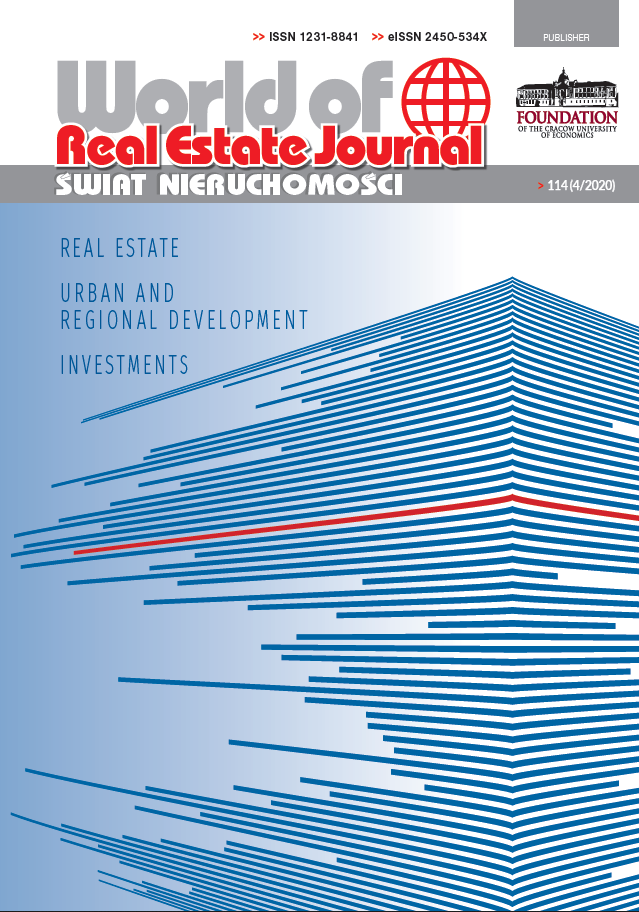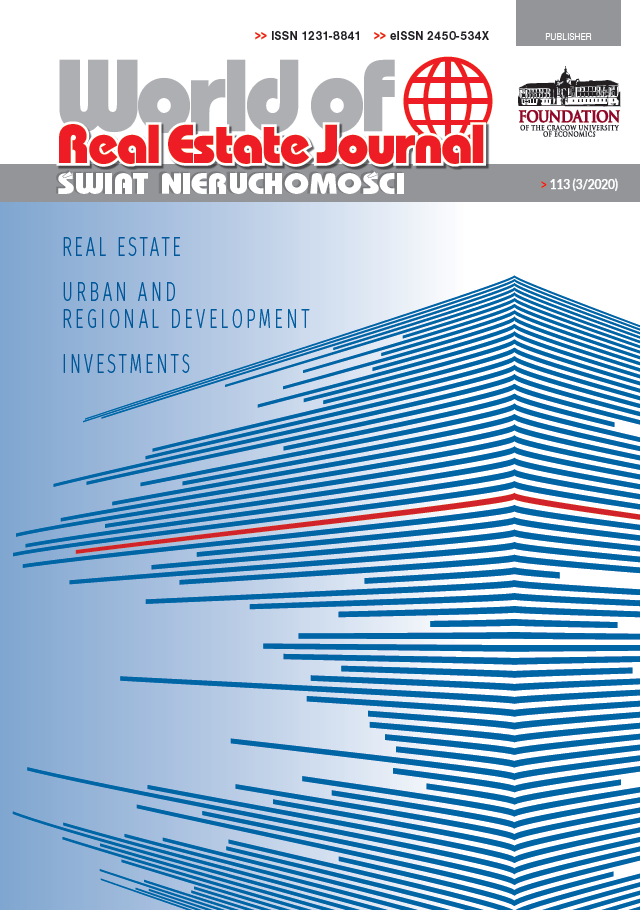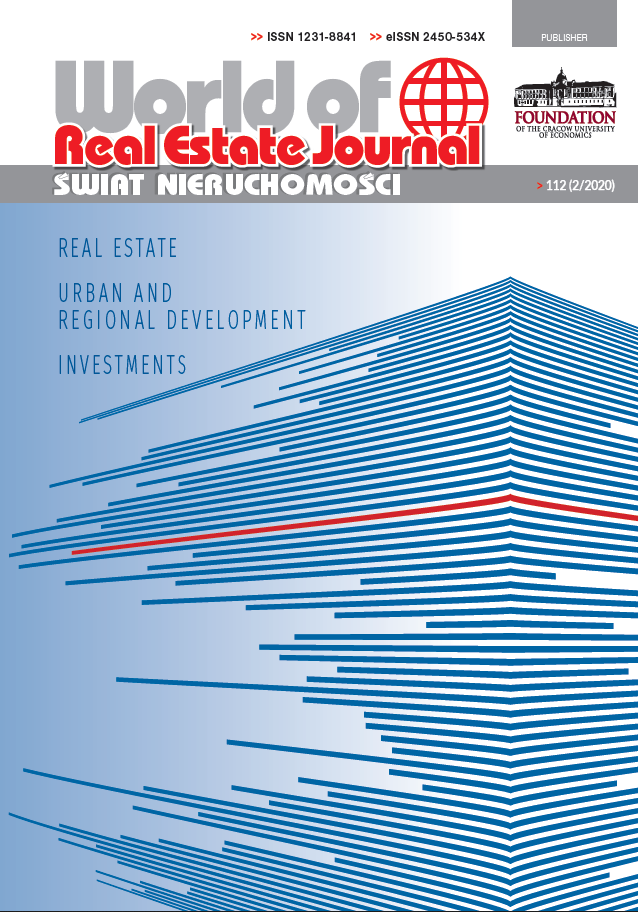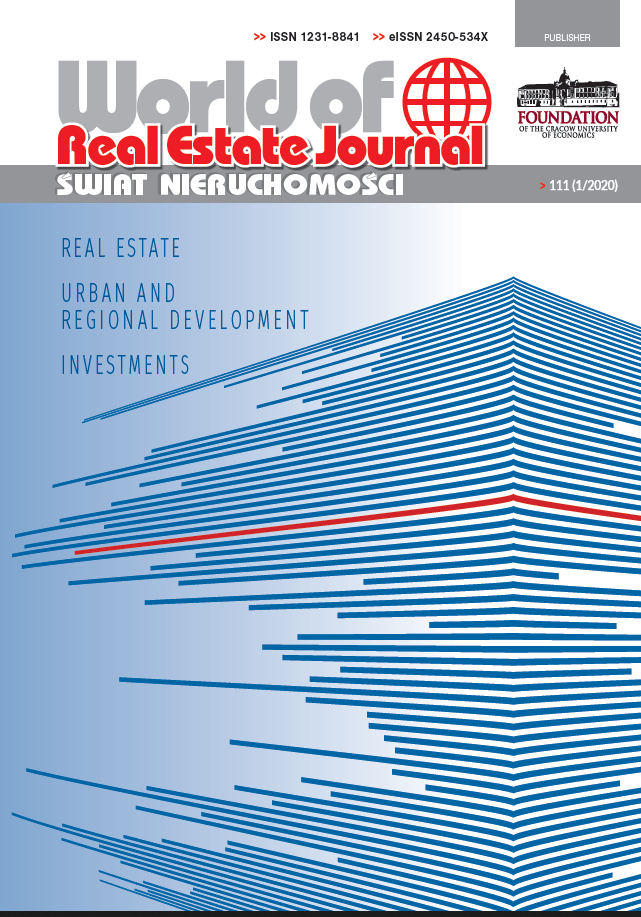REAL ESTATE MANAGEMEMENT
1. Anna Wojewnik-Filipkowska, Małgorzata Rymarzak, Carsten Lausberg - Current Managerial Topics in Public Real Estate Asset Management
2. Joanna Węgrzyn - An Insight into the Behaviour of Real Estate Manager in the Context of Agency Theory
3. Piotr Mika - The Method of Determining the Surrender Value of Water Supply and Sewage Systems
FINANCE
4. Foster Jonathan Nyarko, Jonathan Zinzi Ayitey, Emmanuel Kofi Gavu - Evaluation of Home-Equity Financing Option in aDeveloping Economy, Illustrated with an Example of Ghana
5. Emmanuel Kofi Gavu, Kahad Adamu - The Growth and Challenges of Mortgage Origination in Ghana
6. Michal Głuszak - On the Equity of the Area-Based Property Tax System in Poland
HOUSUNG
7. Beata Lewicka - Senior Housing in Sweden – Organisation of the System and Conclusions for Poland
8. Elżbieta Jasińska - Legal and Economic Conditions for Parking Place Management in the Homeowners Associations
MARKET
9. Andrej Adamuscin, Diana Liptajova - The Comparison of the Retail Development in the Visegrad Group with Focus on Development of Macroeconomic and Retail Indicators
REVITALIZATION
10. Sławomir Palicki, Izabela Rącka, Ivo Kostov - Aesthetic Dimension of Urban Revitalization in Polish and Bulgarian Cities
CONFERENCES
11. Andzrzej Jaki, Tomasz Rojek - 20th Anniversary International Scientific Conference Contemporary Faces and Dilemmas of Restructuring (Krynica-Zdrój, 21st – 24th October, 2015) DOWNLOAD
12. Małgorzata Zięba - International Summit SmartCity360° (Bratislava, Slovakia, 13rd-16th October 2015) DOWNLOAD
13. Marlena Jankowska, Małgorzata Gajos-Gržetić - Science, Administration and Business for the Smart City - Conference (Katowice, 21st October, 2015) DOWNLOAD
WORLD OF REAL ESTATE JOURNAL
14. Table of Contents 2015 DOWNLOAD
LIST OF REVIEWERS
15. List of Reviewers 2014 DOWNLOAD
SUMMARIES
Anna Wojewnik-Filipkowska, Małgorzata Rymarzak, Carsten Lausberg - Current Managerial Topics in Public Real Estate Asset Management
In recent years, public administrations in modern economies have been deeply transformed. Government units have been granted extensive competences, including ownership and/or control over properties in order to fulfil their obligatory tasks relating to public services in a better way. Real estate has evolved from a source of costs to a source of revenues, as well. This complex asset class requires proper management respecting its operational and strategic needs and requirements. The article focuses on current issues of public real estate asset management (PREAM) and on the real estate assets in local governments in particular. It is a voice in the discussion about current problems with regard to the efficiency and effectiveness of PREAM. We propose directions for further research and development as the principles of asset management in modern democratic societies seem to be universal. The paper is based on a literature study and the authors’ observations.
Keywords: public real estate asset management, real estate management, portfolio management, new public management
JEL Classification: H82, D73, H54, L85, R53
Citation (APA): Wojewnik-Filipkowska, A., Rymarzak, M., Lausberg, C. (2015). Current managerial topics in public real estate asset management. Świat Nieruchomości, (4(94)), 5-10.
Joanna Węgrzyn - An Insight into the Behaviour of Real Estate Manager in the Context of Agency Theory
In the article selected aspects of property management are presented. Particular attention is paid to the role of real estate manager and the specificity of the relationship emerging between the manager and the owners of residential units. These problems are discussed in the context of agency theory.
Keywords: housing, housing market, agency theory, real estate management
JEL Classification: D01, L85, R31
Citation (APA): Węgrzyn, J. (2015). An Insight into the Behaviour of Real Estate Manager in the Context of Agency Theory. Świat Nieruchomości, (4(94)), 11-16.
Piotr Mika - The Method of Determining the Surrender Value of Water Supply and Sewage Systems
The article presents a method of determining the water supply and sewage systems value which constitutes a basis for the takeover of such systems by communal water supply and sewage companies from investors. The procedure was tested based on the data obtained from one of the companies in the Lesser Poland region. In the article, the method of performing calculation is shown and the adoption of correction coefficients is suggested. The author analyses the results obtained using the cost approach and based on actual data compares the values from the system construction estimate with the ones from tenders.
Keywords: water supply and sewage systems, surrender price determination, income approach
JEL Classification: R32, G30, G32
Citation (APA): Mika, P. (2015). The Method of Determining the Surrender Value of Water Supply and Sewage Systems. Świat Nieruchomości, (4(94)), 17-22.
Foster Jonathan Nyarko, Jonathan Zinzi Ayitey, Emmanuel Kofi Gavu - Evaluation of Home-Equity Financing Option in a Developing Economy, Illustrated with an Example of Ghana
The introduction of mortgage financing in developing economies such as Ghana has been a marginal success. The framework and the macroeconomic environment necessary for a vibrant and effective mortgage finance system is almost non-existent and may demand a considerable period and a lot of effort to correct such anomalies. This study seeks to explore the prospects of equity financing and further suggests its viability in housing financing for developing economies. The survey confirms the most preferred housing finance option to be equity; this situation results in numerous piecemeal developments, many of which never see completion. The study finds out that due to worsening and unstable economic conditions, equity users often encounter a shortage of equity along the line of construction. We therefore conclude that rental housing is a better option for satisfying the housing needs of the majority of Ghanaians.
Keywords: housing, homeownership, equity financing, incremental development
JEL Classification: H31, R3
Citation (APA): Nyarko, F.J., Ayitey, J.Z., Gavu, E.K. (2015). Evaluation of Home-Equity Financing Option in a Developing Economy, Illustrated with an Example of Ghana. Świat Nieruchomości, (4(94)), 23-28.
Emmanuel Kofi Gavu, Kahad Adamu - The Growth and Challenges of Mortgage Origination in Ghana
Low income levels coupled with huge capital requirement to buy a house has brought about the crucial need for mortgage financing in the housing sub-sector. Equity financing has a different role than debt financing and is especially important in poor countries where most of the population may not qualify to debt financing anyway due to high income instability. A number of researchers conducted analyses at borrowers’ constraints to access the large availability of these funds. Few studies have, however, focused on the supply side of the industry, specifically ascertaining growth of the industry and the constraints to its activities, thus forming the purpose of this study. Data was gathered through interviews and the use of questionnaires administered to 6 of the major mortgage lenders in Ghana between February and March 2014. The results show there has been a significant growth of mortgage origination as indicated by GHc57.9 million in 2008 to GHc341.7 million in 2013. This annual growth caused a steady increment in the ratio of mortgage-debt to GDP evidenced by 0.24% in 2008 to 0.39% in 2013. The performance of the mortgage industry is largely beset by the lack of secure and transparent land title. Other constraints include: macroeconomic instability and the lack of access to long term funds to originate debt instruments.
Keywords: housing, housing deficit, mortgage, mortgage debt, Ghana
JEL Classification: G10, G20, G21
Citation (APA): Gavu, E.K., Adamu, K. (2015). The Growth and Challenges of Mortgage Origination in Ghana. Świat Nieruchomości, (4(94)), 29-36.
Michal Głuszak - On the Equity of the Area-Based Property Tax System in Poland
In the article we discuss the problem of the equity of the area-based property tax in Poland. The fairness of property taxation has been a subject of economic debate in most developed countries – the United States and the United Kingdom being the most evident examples. The discussion has focused on valuebased property tax systems – mainly because this type of property taxation prevails in mature economies. In the paper we discuss previous research. In the last part of the paper we analyse the problem from the theoretical perspective based on PaglinFogarty. We argue that the area-based property tax system in Poland is not equitable. Based on current practice we conclude that it is mostly regressive.
Keywords: Poland, tax equity, area-based property tax
JEL Classification: H2
Citation (APA): Głuszak, M. (2015). On the Equity of the Area-Based Property Tax System in Poland. Świat Nieruchomości, (4(94)), 37-44.
Beata Lewicka - Senior Housing in Sweden – Organisation of the System and Conclusions for Poland
The aim of this paper is to present the organisation of Swedish senior housing and the mechanisms of its functioning. After an analysis of this issue, conclusions for Poland have been provided. Sweden experienced the consequences of the aging population process earlier than Poland. In order to minimise its negative effects, the Swedes managed to create a few solutions for supporting seniors, especially in the field of housing and long-term care. One of the most significant measures which was taken to achieve this goal was to oblige municipalities to take full responsibility for elderly care. Thanks to that, Swedish local authorities decided to privatise parts of their tasks and take part in creating supply for senior housing on the real estate market.
Keywords: senior housing, Sweden, municipalities, population aging
JEL Classification: H42, J14, I31
Citation (APA): Lewicka, B. (2015). Senior Housing in Sweden – Organisation of the System and Conclusions for Poland. Świat Nieruchomości, (4(94)), 45-50.
Elżbieta Jasińska - Legal and Economic Conditions for Parking Place Management in the Homeowners Associations
The perception of multi-family houses has been changing for years. These changes were accompanied by the gaps in the construction law, the lack of local spatial development plans or fiscal regulations concerning the amount of charges and taxes for the selected parts of the real property. This article presents the selected aspects of managing the common areas of the real property, illustrated with an example of parking places. The key issues of concern resulting from different approaches to these places as a common property are discussed and analysed. The differences in their perception as a part of land or building or as independent premises being a separate property are described. The final part of the publication presents the controversies arising with regard to such real properties and concerning the separation of individual land properties intended only and exclusively for parking purposes or introduction of package deals, in which the purchase price of a parking place is supposed to compensate the price of residential premises.
Keywords: parking place, homeowners associations, common property, real estate management
JEL Classification: R31
Citation (APA): Jasińska, E. (2015). Legal and Economic Conditions for Parking Place Management in the Homeowners Associations. Świat Nieruchomości, (4(94)), 51-56.
Andrej Adamuscin, Diana Liptajova - The Comparison of the Retail Development in the Visegrad Group with Focus on Development of Macroeconomic and Retail Indicators
Twelve years after the EU accession and the financial crisis, the socio-economic progress in the Visegrad Group - V4 is plain to see, also demonstrated by the development in the V4 retail market. After the crisis years of 2008 and 2009, the retail market in the countries of V4 stabilised in 2010, but retailers were very cautious. They continued analysing their financial results carefully and many companies still looked to cut costs. Some retailers closed unprofitable stores in order to focus on those units which were profitable. Since 2012 growing optimism has been visible, which is proven by the continued growth in retail sales across the V4 countries. There are new drives for expansion, mainly from international retailers. The drive is not as aggressive as before the crisis and can be heavily impacted by the further geopolitical development, but still some improvement in the mood on the market is observed. The ratio of online sales to total retail sales continues to increase as e-retailers tested out new forms of electronic commerce to boost sales and attract consumers. The paper deals mainly with the comparison of development of the retail markets in the countries of V4 with an analysis of the development of macroeconomic and retail indicators after the financial crisis.
Keywords: economic growth, financial crisis, retail market, Visegrad Group (V4), macroeconomics indicators, retail indicators
JEL Classification: E20, F16, L81, O10, R30
Citation (APA): Adamuscin, A., Liptajova, D. (2015). The Comparison of the Retail Development in the Visegrad Group with Focus on the Development of Macroeconomic and Retail Indicators. Świat Nieruchomości, (4(94)), 57-66.
Sławomir Palicki, Izabela Rącka, Ivo Kostov - Aesthetic Dimension of Urban Revitalization in Polish and Bulgarian Cities
Culture is an important factor in the process of revitalisation, as it creates a new identity of the place and builds the image of the city. Artistic aestheticization of deteriorated areas is associated with the concept of ‘beauty’, which is relative and interpreted by people in different, individual ways. The ‘beautification’ of cities, which has become a widespread phenomenon, involves investing in the architectural fabric, street furniture, public green spaces or public art. Artists ennoble space, making it unique. The aim of the paper is to admit and analyse a new phenomenon of a conscious use of artistic aestheticization in the processes of revitalisation. The authors have collated the knowledge of these forms in Polish and Bulgarian cities. Based on the research carried out in 2015, artistic aestheticization has a positive effect on the image of revitalised space in the perception of its users.
Keywords: city, revitalisation, artistic aestheticization, Poznań, Kalisz, Varna
JEL Classification: R33, R58
Citation (APA): Palicki, S., Rącka, I., Kostov, I. (2015). Aesthetic Dimension of Urban Revitalisation in Polish and Bulgarian Cities. Świat Nieruchomości, (4(94)), 67-72.





















































